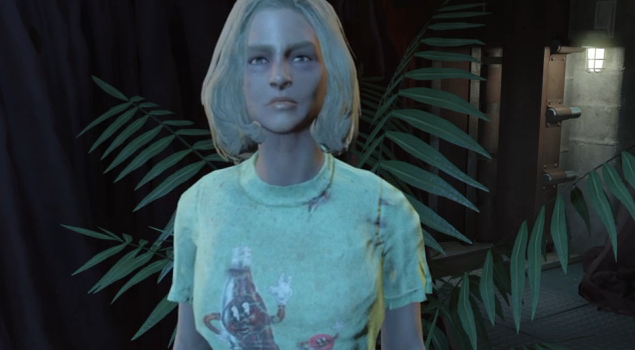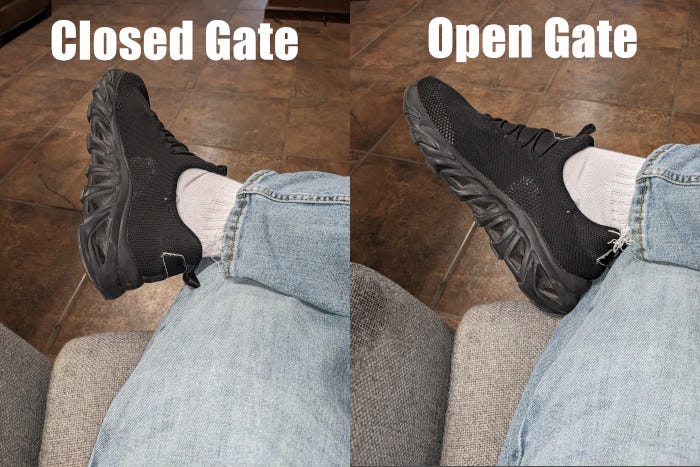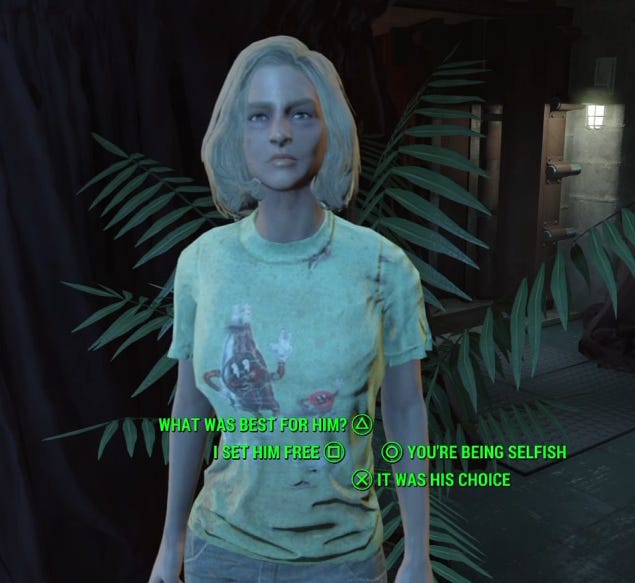Will I Ever Confront a Stranger in Real Life?

Video games are a power fantasy, but I only recently realized what that might actually mean. I’ve long assumed that the “power” part of the fantasy refers to a game’s ability to give players focused agency: shoot what you want, how you want, and when you want. A fantastical power. Or, maybe not just “power,” as in firepower, but also narrative power: talk to who you want, when you want, and about what you want. Or, puzzle power: move the blocks you want, when you want, and how you want.[1]All this power must be within the confines of the game’s design, of course. Otherwise, the fantasy isn’t a fantasy. It’s just blank paper and some crayons. Freedom equals power.
But I recently realized a different form of power fantasy that video games allow: the power not just to make a decision but to be confident about that decision. See, my life is filled with assumptions (at work, I assume what that pie chart means; at home, I assume that my kids and I agree on what “clean” means). Video games provide feedback (ie, answers to questions) that instill confidence.
But I recently realized a different form of power fantasy that video games allow: the power not just to make a decision but to be confident about that decision.
Eradicate assumptions…most of the time
I have a mantra at my day job: eradicate assumptions. Basically, I ask enough questions until a situation has exposed all of its variables so that I can make a good decision. Eradicating assumptions has been an incredibly positive practice in my daily life. I ask what a pie chart means, even if it seems obvious. I review action items following every meeting because it’s dangerous to assume that everyone knows what they need to do and equally dangerous to assume that I know what they need to do. Maintaining such assumptions forces me to reserve space in my “head RAM” for this unknown data. That’s not fair to me or to the person who is unwittingly being charged with my own assumptions.[2]Dear Google Calendar, please remove the option for an event guest to select “maybe” as an option for attendance. “Yes” and “no” are all we need. Thank you. Eradicate assumptions.
Playing and developing video games over the years have allowed me to live in a glorious utopia of eradicated assumptions. I don’t worry about “what if” because the “whats” are all there for me to parse. My health bar is always visible when I’m put in situations where health can be impacted. My character’s heavy breathing indicates critically low stamina. A well-designed game gives players access to the information they need to make a decision when that decision needs to be made. Well-designed games eradicate all assumptions. Well-designed games avoid paralysis by assumption.
Well-designed games eradicate all assumptions. Well-designed games avoid paralysis by assumption.
But while video games can always be distilled down to binary decision trees, people are generally pretty complicated. This reality has led me to a default state of apology when outside my warm, comfortable world of gameplay feedback.
Most of the words that come out of my mouth during interactions with living (ie, non-video game) people are forms of an apology. I think this habit boils down to a lack of interest in competition, conflict, and even coercion. I accept life as it is, rarely fighting for myself. This isn’t a noble stance; don’t be confused. It’s almost certainly more of a lazy stance.[3]Some might take this immediate categorization of my act as “lazy” as just an example of my anti-conflict nature. Those people are probably right…again, I automatically say the other person is … Continue reading People can be so nuanced, so idiosyncratic, that no number of questions can eradicate every assumption. So, I operate under a universal assumption to blanket all unknown assumptions: I assume I am always in the wrong. This is my safety blanket assumption, a failsafe for human interaction.
Inside my safety blank of assumed fault
I’m so non-confrontational that I approach every interaction as an assumed competition that I’ve already lost. In this way, my competitor no longer has any reason to fight. We can move on to more important things (like assumptions that can be confidently eradicated). When interviewing subjects for my What Remains of Edith Finch book, my interview pre-amble often tripped aimlessly amid caveats to shield against assumed animosity. This book will be a love letter of sorts, it’s NOT a hit piece…I know you maybe never thought it was a hit piece, but you know, just in case you did, you shouldn’t think that…not that you’re wrong to have thought that. I mean, there are always vultures circling, right? But I’m not a vulture, unless you like vultures, then let’s talk about vultures. Let’s forget this interview entirely; this should be about you, not me. What’s your favorite vulture fact?
At work, part of my job involves teaching people how to use software. For every wrong click my student makes I apologize. I should have guided better. I give them no room to defend their actions. Instead, I apologize. Let’s try again. This time, I’ll do better.
When I pass strangers in the grocery store, close but not touching, I do so with a “pardon me” hanging from my lip. Always. The fear of collision, of confrontation, is enough to prime an admission of my own guilt even when, rationally, no guilt is necessary.
I’d like to think that my always-assume-I’m-wrong stance on life has led to strong relationships and a better understanding of the people around me. My rationale is that if I show the other person how much I respect them (by pre-conceding to any of their truths) then the other person doesn’t see me as a threat and is more likely to be open and honest with me. Surely, though, this has backfired; can people see through this, lose faith in my humility, find me not worth their time? Probably.
My rationale is that if I show the other person how much I respect them then the other person doesn’t see me as a threat and is more likely to be open and honest with me.
Even my movements, wordless, are gestures of apology. I tend to sit cross-legged, one leg crossed over the other, meeting the lifted leg’s ankle against the grounded leg’s knee. When sitting this way anywhere in public where the chairs crowd a walking route—waiting rooms in doctor offices, airport terminals, the DMV—my hanging foot searches for a stranger walking like a dog’s snout hunting smells from a car window. Upon sensing stranger movement, I flex my ankle open, like a salon door, to let a stranger pass, for concern that they just might, despite their distance, be forced to carve a path around my foot. Would the extra few inches I offer even matter to a stranger already given in to the labor of foot travel? No. Certainly not. I know this, but I move my foot anyway.

Team Quiet versus Team Loud
Even my lack of movement is an apology. At my favorite writing spot (a local cigar lounge; maybe a topic for a future post), there’s a tension that sometimes suffocates the room. A divide exists between those of us who want quiet—who want focus, who want to work or read or simply enjoy the silence in a way that life otherwise prohibits—and those who see the three 70” wall-mounted TVs and assume that those TVs are meant to be used (assume rightly, I concede). Unfortunately, their use comes with a kingly control over the TV volume, a power too many on Team Loud wield haphazardly. It doesn’t help my side, Team Quiet, that the chairs along the half-perimeter facing the TVs are large and soft enough to camp in and their collective shape (tiny crescents) encourages conversation. The room isn’t built for Team Quiet. In the battle of Form v. Function, where one must precede the other, Team Loud takes the Form victory at the cigar lounge.
In the battle of Form v. Function, where one must precede the other, Team Loud takes the Form victory.
A few days ago, I arrived early to the cigar lounge. Early arrival is the only way to stake claim to Lounge Land for Team Quiet. Even a soldier from Team Loud, upon entering a silent room already occupied by Team Quiet, sometimes questions their own alignment, unwilling to interrupt a stranger’s focus by turning on the TVs. My presence is enough for them to question their own presence. I respect these wartime sympathizers.
That day, I managed to hold the territory for a full two hours. Just me, my computer, and three powered-down TVs. It was a glorious day.
Two hours is about as long as I can write in a single stretch. So, satisfied with my output, I remove my Team Quiet armor—two foam earplugs— and prepare my exit.[4]My preferred brand of earplugs come in both a light tan color (the color of my white-guy skin) and bright blue. I use the blue model, because what’s the point of flesh-colored ear plugs? I want … Continue reading But then, like an assassin in the night, a Team Loud soldier arrives. He plops down in a chair directly opposite the center of the three TVs and powers on the center screen to a basketball game, mashing the volume-up button before the sound even has a chance to escape from the speakers, before he even has a chance to measure the need for his volume raid. This guy is a pro, a Capitan. A Lieutenant, at least.
I freeze. I had already decided to leave, but now I have to consider my options. But—and here’s where my lack of wartime commitment reveals itself—my options are not in service to this outward battle of Loud versus Quiet. Rather, my options are in service to my inward battle of optics: if I leave now, this TV guy will think I’m leaving because of his arrival, because I don’t like him, or because I’m mad at his mere existence, because, I mean, nothing else has changed. His arrival is the only variable. My leaving is the only result. The assumed conflict paralyzes me. My own Lieutenant would be very disappointed in me.
Of course, I say seated. In lieu of my exit, I re-read what I had just finished writing, pretending to do an edit pass, but thinking “how long is long enough so that this TV guy doesn’t mistake my exit for a frustrated, huffing-and-puffing, angry exit?” The real answer, the logical, rational, actual answer: no amount of time is long enough, because the very conceit upon which my “problem” is built is dumb. Caleb, just stand up and leave! That guy is already yelling at the screen because some guy failed to put a ball in a hoop. He doesn’t even know you are there.
…the very conceit upon which my “problem” is built is dumb.
Even should I frame this tension through the lens of my Loud versus Quiet battle, staying seated only communicates to my rival that the interruption is okay. Team Loud doesn’t learn anything if I stay. There’s legitimately no reason to not leave. I’m both a paranoid human AND a bad soldier.
I speak only in apology. I move according to apology. I remain unmoving according to apology.
While maintaining a safety blanket assumption of fault eliminates the need to eradicate so many other assumptions, video games offer a respite even from that one blanket assumption. When playing video games (and when programming video games), I get to live a life without any assumptions. It’s delightfully freeing.
When playing video games, I get to live a life without any assumptions.
In my forthcoming video game essay, “There are No Kidney Stones in the Commonwealth: How Fallout 4 Saved My Life,” I poke fun at Fallout 4’s dialog system (Pre-order the essay on Amazon or become a paid subscriber to read it here on Substack and to receive a .epub version of the essay when the essay is released). Each dialog tree offers only four responses to any statement. These choices are not only limited in number but they are also limited in the nuance that so many other RPGs have accepted as necessary convention. But upon writing that essay I was reminded about the comfort such definitive, and limited, choice can bring. I re-fell in love with a video game’s commitment to exposed variables, to a world without assumptions.

Maybe I should try my hand at confrontation in real life. Maybe I don’t have to rely so heavily on my safety blanket assumption of fault. Maybe I can actually tell a stranger they are wrong.
Will I, though? Will I ever confront a stranger? Probably not. I fear I won’t just be paralyzed by assumptions but might also get paralyzed by fists.
Footnotes
| ↑1 | All this power must be within the confines of the game’s design, of course. Otherwise, the fantasy isn’t a fantasy. It’s just blank paper and some crayons. |
|---|---|
| ↑2 | Dear Google Calendar, please remove the option for an event guest to select “maybe” as an option for attendance. “Yes” and “no” are all we need. Thank you. |
| ↑3 | Some might take this immediate categorization of my act as “lazy” as just an example of my anti-conflict nature. Those people are probably right…again, I automatically say the other person is the correct person. Ugh. This trap of mine! |
| ↑4 | My preferred brand of earplugs come in both a light tan color (the color of my white-guy skin) and bright blue. I use the blue model, because what’s the point of flesh-colored ear plugs? I want people to know, from dozens of feet away, that I want nothing to do with them. |


